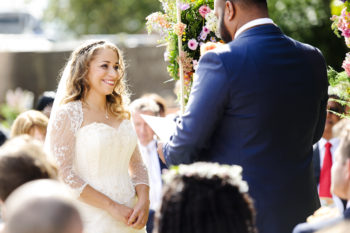
An analysis of newly released official statistics reveals that for the first time, there were more humanist marriages in Scotland last year than there were Christian marriages. Humanist marriages made up 23% of all marriages, while Christian marriages made up 22%. Humanists UK has called on the UK Government to urgently recognise the need to bring about legal recognition of humanist marriages in England and Wales, pointing to the new statistics as showing evidence of demand, and the likely over-demand for civil registrars following on from the coronavirus pandemic.
The new statistics were released by the National Records of Scotland earlier this week and then analysed by Humanists UK to calculate the total number of humanist and Christian marriages. In total there were 5,879 humanist marriages, compared with 5,812 Christian marriages. Humanists UK’s sister organisation Humanist Society Scotland was the largest single provider of marriages, with its celebrants conducting 3,276. The Church of Scotland conducted 2,225 marriages, while the Catholic Church conducted 911.
About humanist weddings
A humanist wedding is a non-religious ceremony conducted by a humanist celebrant who shares the beliefs and values of the couple. It differs from a civil wedding in that it is entirely personalised and reflective of the humanist beliefs and values of the couple.
Humanist marriages are legally recognised in Scotland, Ireland, Northern Ireland, and the Channel Islands, but not England and Wales. They gained legal recognition in Scotland in 2005. In the Republic of Ireland, they gained legal recognition in 2012 and in 2019 around 9% of legal marriages were humanist, placing the Humanist Association of Ireland only behind the Catholic Church and civil marriages. They gained legal recognition in Northern Ireland in 2018, following a Court of Appeal ruling that concluded that a failure to do so would be a breach of human rights. Jersey also gave legal recognition to humanist marriages last year and the Guernsey Assembly has passed legislation that from next year will the same.
In England and Wales, over 1,000 couples a year already have a humanist wedding without legal recognition. They all must have a separate civil marriage – usually at a registrar’s office – for their marriage to be legally recognised, even though it is not what they want. Couples must go through formalities twice, leading to financial strain, and distress over the state failing to recognise their humanist wedding as their ‘real’ one.
House of Lords pressure
The matter was raised in the House of Lords yesterday by All-Party Parliamentary Humanist Group members Lord Low and Baroness Hayter. Lord Low said ‘Once weddings resume, there will no doubt be a huge backlog of demand for registrars, that could easily stretch through to the end of next year. One way the Government should seek to ease that demand is by extending legal recognition to humanist marriages, which would stop couples who want to have a humanist wedding from having to also have a civil marriage to gain legal recognition. Humanist marriages are already legally recognised in Scotland, Northern Ireland, and the Republic of Ireland. Will the Government commit to acting now to bring about similar recognition here?’
This was rejected by Government minister Lord True, who said ‘No my Lords, the current law on marriage is set in primary legislation and the Government has no plans to change it.’
Speaking for the Labour frontbench, Baroness Hayter then said ‘Could I regret the minister’s rejection of any thought being given to permitting humanist marriages, which would obviously stop couples from civil weddings. May I urge him to perhaps take time to think again about that?’ Lord True replied, ‘My Lords, I said that the Government has no time for primary legislation on this matter, and that is the position.’
Lord True’s answers were erroneous because in 2013 Parliament voted to give the Government the power to bring about legal recognition by Order (i.e. secondary legislation). The Government simply hasn’t enacted that power since.
The UK Government has announced that marriages will be able to resume in England from 4 July.
Humanists UK Chief Executive Andrew Copson commented: ‘The huge popularity of humanist marriages in Scotland shows just how many people want to have them when they are legally recognised. The fact that they are not legally recognised in England and Wales is a growing travesty.
‘There has never been a more pressing need for this reform than now, with couples having to delay their humanist weddings simply because there are no civil registrars available in their area for some time. Given the significant and growing backlog of registrar bookings, the UK Government should seek to unclog the system by bringing about legal recognition. This would mean that those couples who want a humanist wedding ceremony would not have to also have an unwanted civil marriage ceremony in order to be married in the eyes of the law.’
Notes:
For further comment or information, please contact Humanists UK Director of Public Affairs and Policy Richy Thompson at press@humanists.uk or phone 020 7324 3072 or 020 3675 0959.
Read more about Humanists UK’s campaign for legal recognition of humanist marriages.
Humanists UK is the national charity working on behalf of non-religious people. Powered by over 85,000 members and supporters, we advance free thinking and promote humanism to create a tolerant society where rational thinking and kindness prevail. We provide ceremonies, pastoral care, education, and support services benefitting over a million people every year and our campaigns advance humanist thinking on ethical issues, human rights, and equal treatment for all.
